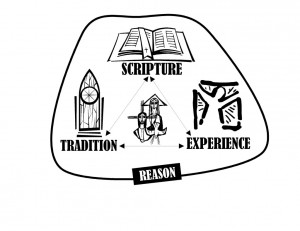
By Ben Smith
On Thursday, September 20th, Reverend Jackson came to speak in chapel. As usual, Jackson delivered a message that was passionate and awakening, but this time, he did not have Wesleyan tradition backing him in a pivotal claim.
I will argue that Jackson did not have a Wesleyan-based theology when he made the claim that the way to tell if someone is a Christian is if the people around the person claiming to be a Christian still sin, then he/she is probably not a Christian. First, I will address some personal properties that those who know me might argue is the true cause of the writing of this letter to the editor. Second, I will paraphrase the criterion that Jackson argued in favor of. Third, I will give the grounds by which I will argue this criterion is not Wesleyan-based, primarily the principle of the Wesleyan Quadrilateral. Fourth, I will argue that Jackson’s criterion fails all four of the categories suggested in the Wesleyan Quadrilateral, beginning with Scripture, then Reason, followed by Tradition, and ending on Experience. I will conclude the overall letter with a type of hedge.
Let me begin by admitting something about myself: chapel is not my favorite part of the SNU experience. In fact, many who know me are not surprised when there is something said in any given chapel that causes me to wrinkle my brow and think “does the speaker really believe that?” But this argument is not created out of vanity or an excuse to undermine chapel. Rather, it is merely an argument to investigate whether Jackson was supported by the Wesleyan tradition in his test for seeing if one is truly a Christian.
Now that my confession has been stated, I will summarize what I saw as his criterion for those who missed chapel or do not attend SNU. Jackson’s criterion is that if someone claims to be a Christian and he/she hangs out with people, if the people the Christian is hanging out with still sin, then the Christian is probably not really a Christian. Perhaps I should be more precise though. Jackson used the examples of cussing, drinking, and lewd jokes. He never explicitly stated this criterion in the way I paraphrased. However, I assume, and perhaps unfairly (and if so, I apologize) that Jackson was using these as a stand-in for all sins, mainly because they’re the sins people our age are most likely to encounter. If this is true, then my original paraphrase stands. However, if he really did just mean these three, I can’t help but wonder what makes them worth the criterion and not other more heinous sins (such as murder, rape, blasphemy and the like).